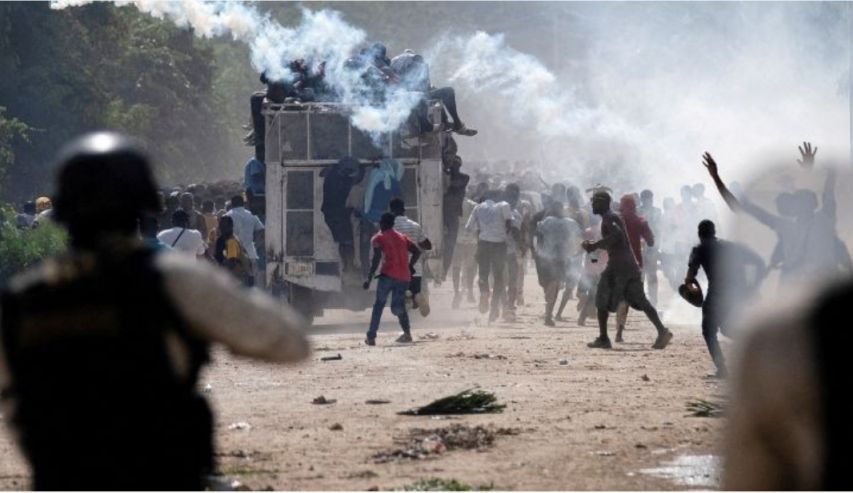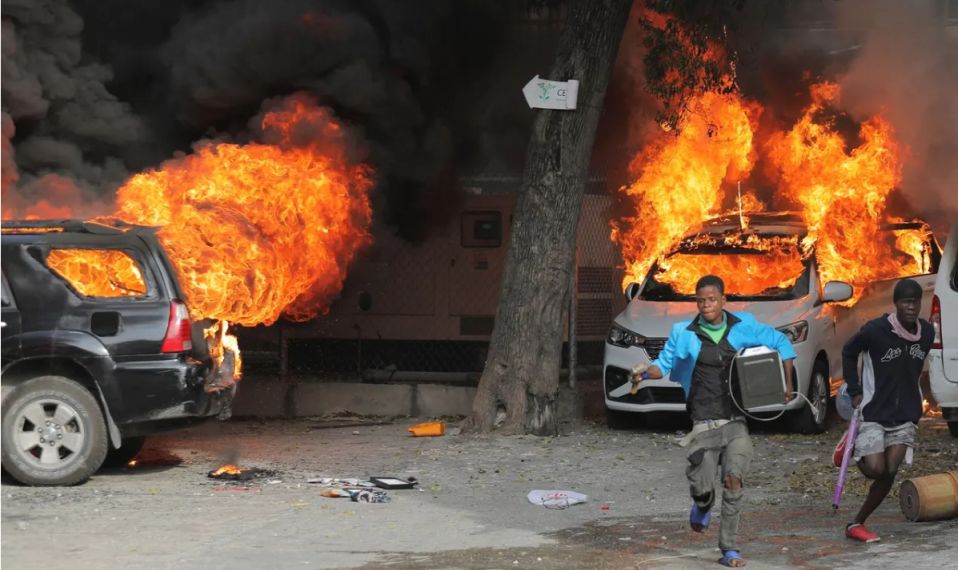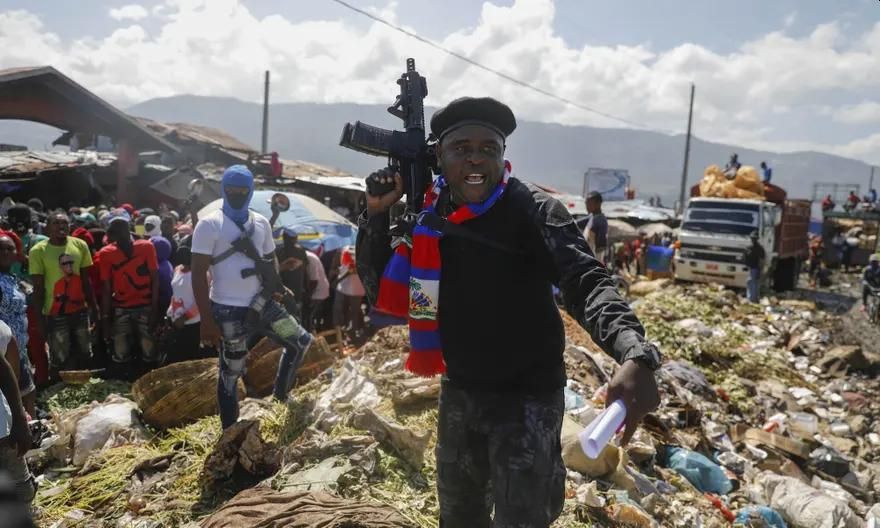By Eric Vandenbroeck
and co-workers
The Problem With Haiti
Gang violence,
kidnapping, and intimidation have forced about 96,000 people to flee their homes
in Haiti’s capital, the UN’s International Organization for Migration (IOM)
said on Friday, as the country faces a crisis that has prompted the
government to request the immediate deployment of foreign troops.
As conditions grow
ever direr, gangs prevent humanitarian assistance from reaching those on the
brink of death. A record 4.7 million people face acute hunger, and almost
20,000 people are enduring “catastrophic hunger,” meaning they are at risk of
starving to death, according to an October report from the UN World Food
Program and the Food and Agriculture Organization. Those in greatest danger
live in Cité Soleil, the largest slum in the
country’s capital, Port-au-Prince, and home to about 260,000 people. Gangs
control the area; for the past six months, lawlessness and violence have made
it nearly impossible for urgent humanitarian assistance to reach those in need.
They fight between
rival gangs to control roads leading to the capital, causing nearly 500
deaths over the summer. Violence has effectively severed Port-au-Prince’s 1.5
million people from the rest of the country. Gangs are believed to
control 60 percent of Haitian territory. They have stopped gasoline, water, and
other essentials from reaching communities and have blocked patients trying to
reach clinics for urgent medical attention.
The violence and
instability have also created conditions for cholera to make a deadly comeback.
In February, Haiti declared victory over the disease, which spreads through
contaminated water after fighting it for over a decade. But since then, the
lack of fuel has prevented pumps from working, and now, without access to clean
water, people are contracting the disease again. The difficulties of
getting health care will only hasten mass contagion. There are no reliable
figures for how fast cholera spreads: the government has recorded 200 deaths
and almost 10,000 cases, but that is likely a significant underestimate.

Against this grim
backdrop, Ariel Henry, Haiti’s unelected acting prime minister, and 18
high-level Haitian government officials formally requested the deployment of
foreign troops to support the Haitian National Police’s fight against gangs in
early October. The hope is that international forces could also halt the spread
of cholera—rather than spur it as they have in the past: the UN Stabilization
Mission in Haiti (MINUSTAH), which packed its bags five years ago, left behind
a broken reputation and deep-seated animosity for foreign troops as the sewage
that poured from the mission base contaminated a nearby river and caused the
2012 cholera epidemic. The disease sickened half a million Haitians and killed
almost 10,000.
Neither the supposed
beneficiaries of a new intervention nor the powers that could supply it look at
the prospect with anything less than foreboding. Although many Haitians may be
deeply skeptical as to whether an international mission will resolve Haiti’s
interwoven political, humanitarian, and security crises, a growing number of
voices inside and outside the country are even more alarmed by the risk of
sitting back. At the same time, a cholera epidemic festers under the watch of
predatory armed gangs. A quick military deployment that changes the
balance of force and allows supplies to reach communities is most likely the
only approach that would bring immediate relief. But the political and
operational challenges for such an effort might be insurmountable.

A History Of Making Bad Situations Worse
Many Haitians
vehemently oppose bringing in foreign troops to solve Haitian problems.
Politicians, opinion leaders, and citizens on social media insist that past
foreign military interventions, whether led by U.S. Marines or UN peacekeepers,
have only subjected the country to the iniquities of colonial rule and left a
host of unresolved problems in their wake. The United States has led three
military interventions in Haiti. The first one occurred after the assassination
in 1915 of President Jean Vilbrun Guillaume Sam and
lasted almost 20 years, during which the United States took control of Haiti’s
finances and created legislation that defended American interests. The United
States returned to Haiti in 1994, when it reinstated Jean Bertrand Aristide,
the popularly elected president who had been overthrown in a military coup
three years before. It would return ten years later to escort Aristide into
exile after armed groups had taken over two major Haitian cities. The deposed
president would later claim the United States had kidnaped him. American troops
remained in the country as part of a multilateral force until MINUSTAH replaced
them in 2004. Over its 13 years of existence, MINUSTAH mobilized over 9,000
troops to reduce violence throughout the country effectively. Its role in the
proliferation of cholera and the involvement of UN blue helmets in sexual
abuse, however, stained its legacy.
There is also a
strong feeling in Haiti that foreign meddling in Haitian problems has only
empowered corrupt actors and exacerbated political dysfunction. A coalition of
civil society groups organized around a platform known as the Montana Accord
has insisted that it is time for a “Haitian-led solution.” A few days
after Henry requested military assistance in October, thousands took to the
streets of Port-au-Prince to protest the possible arrival of foreign forces.
But many Haitians are
reluctantly wrestling with the idea that there may be no other option. When
asked by Crisis Group if he supported the idea of foreign troops, Samuel Madistin, the president of the Je Klere
foundation, a civil society organization in Port-au-Prince, responded that
fixing the problem is more critical than who fixes it. “We have more than 200
violent gangs, which are well-armed and equipped, often better than the
police,” he said. “People are kidnapped every day. The police are even
incapable of protecting themselves. Women are filmed being raped in the street,
gangs on social networks post videos to humiliate them further, and the police
cannot intervene. The situation is extremely dire. People often don’t ask the
right questions. Whether for or against foreign military intervention in the
country is not the right question. For us, the question is whether Haiti has
crossed the threshold of the duty to interfere today. We think so.”

Public discontent
with a government regarded as incapable of subduing the gangs or guaranteeing
the most basic rights to its citizens increased in September after Henry
announced drastic cuts in fuel subsidies, following guidance from the
International Monetary Fund. Many Haitians depend on fuel to run generators
that provide electricity and running water to an impoverished population: more
than half the country lives under the poverty line. Without subsidies, many cannot
afford to buy fuel. Massive protests across the country demanded that the
acting prime minister step down. Infamous gang leader Jimmy “Barbecue” Chérizier, a former policeman who leads the G-9 criminal
alliance, claimed that his henchmen would maintain their blockade of the
crucial Varreux fuel terminal that began in September
until Henry resigned while also demanding amnesty for gang members and
cabinet seats for his outfit. The police have since cleared gangs from the
terminal, at least temporarily.
Please Help
Watching the security
situation in Haiti worsen, diplomats in New York started discussing the
possibility of sending military support to the Haitian police in July, and a UN
mission to assess needs visited the country soon after that. Following Henry’s
formal request for international military assistance in early October, UN
Secretary-General António Guterres endorsed the proposal in a letter to the UN
Security Council, where it was later discussed at the request of Mexico and the
United States. Those two countries also drafted a resolution establishing
sanctions against gang leaders and their sponsors, including an asset freeze, a
travel ban, and an arms embargo. The Security Council unanimously adopted it on
October 21. Another draft resolution, which so far has not been sent to the
whole Security Council, proposes the creation of a multinational force
that would operate with the UN's blessing but not under the mandate.
A “rapid action
force,” as described in the letter Guterres sent to the Security Council, would
be made up of “special armed forces personnel,” but it is not clear who would
lead the mission or supply the soldiers. Mexico and the United States are
looking for Caribbean, Latin American, and African countries to offer
personnel. Still, no country has agreed to lead what Guterres describes as “the
planning and start-up, command and direction of operations.” Canada, a country
with a long history of involvement in Haiti, is the top candidate and is
favored by the United States. Still, Ottawa is weighing the operational risks
of fighting an enemy embedded in civilian communities and the challenges of
doing so in a fraught political environment.
If a rapid action
force could work with the Haitian police to clear the gangs from ports, roads,
and airports and enable the delivery of clean water, fuel, medical supplies,
and food, Haiti’s most beleaguered communities would, at last, enjoy some
respite from hunger and potentially lethal confinement. It is challenging for
countries close to Haiti, above all those in the Americas, to turn their backs
on Henry’s explicit request for assistance when it comes at such a dire moment.
Yet what causes anguish to the mission’s potential foreign backers and contributors,
as well as to Haitians who support it, is not whether there is a case for
intervention but whether the conditions are in place for anything more than a
fleeting success followed by a return to today’s dangerous situations, or
worse.
Perhaps the most
significant risk is political. Henry, who was appointed in the aftermath of the
assassination of President Jovenel Moïse in July 2021, is unpopular. Yet, he remains in power
thanks to the support of the so-called Core Group of ambassadors from Brazil, Canada,
France, Spain, Germany, the United States, and the EU, as well as
representatives from the UN and the Organization of American States.
A wide-ranging
political agreement between Henry, supporters of the Montana Accord, and other
parties and stakeholders in Haiti, including prominent businesspeople, would
ideally precede the arrival of foreign troops and establish clear parameters
for their mission. But the dialogue between the government and the Montana
group has gone nowhere. Henry has refused to reach a compromise on changes to
Haiti’s system of government, a core demand from the opposition and
representatives of the Montana group have remained steadfast in their demand
that the prime minister—who they say was involved in the killing of president Moïse (no charges against him have been brought forward)
and is emblematic of Haiti’s disgraced and corrupt political system—should
resign first.
Key figures in the
opposition think that Henry’s hold on power is feeble and are hoping he will be
forced to resign soon. The arrival of foreign troops could give the country
some respite and strengthen the prime minister’s hand. Possibly emboldened
by that prospect, Henry still has not presented evidence of progress in
negotiations with the opposition. However, the UN Security Council explicitly
asked him to do so by October 17. At the same time, almost no one in the
political elite can now claim a constitutional mandate: the remaining
legitimately elected officials in Haiti—a rump group of ten senators—will see
their terms expire in January.
How foreign troops
might cooperate with the national police and their engagement with civilians
present another major hurdle. Gangs thrive in poor, densely populated urban
areas, operating as local patrons and recruiting unemployed young men. As
foreign and Haitian forces seek to clear gangs from the country’s economic
lifelines, such as roads, ports, and centers of commerce, they would inevitably
come face to face with the local population, especially if their operations reach
deep into the gangs’ strongholds or if they face protests following the death
or capture of gang leaders. An even trickier scenario is the possibility of
popular demonstrations against Henry that draw on the active participation of
gangs and perhaps their most visible leaders. How would an international
security force react if, as has happened on previous occasions, gang leaders
such as Chérizier of the G-9 criminal alliance, or Ti Will, who commanded the rival gang Cannibal Army, were
part of such a march? A clash that leaves civilians hurt or dead would likely
trigger significant unrest; the death of foreign soldiers could quickly ratchet
up tensions.
Another daunting
question looms over the future of any prospective mission. How can foreign
powers design an international military force with a realistic exit
strategy and avoid another long-term intervention? The potential mission's
immediate goal is to secure ports and airports and build a humanitarian
corridor for the communities facing starvation and cholera. But in his letter
to the Security Council, Guterres envisions that this rapid intervention would
need to be followed by the deployment of a multinational force to support the
police. International partners’ reluctance to commit human and economic resources
stems partly from the likelihood that plans for an initial six-month stint
could morph into an intervention lasting years.
In addition, a law
enforcement strategy, although urgent, will not remedy the deep roots of
violence. According to the World Bank, Haiti is the most inequitable country in
the Americas. Large parts of the population have no pathway out of poverty, and
political and economic elites have long used gangs as private shock troops to
defend their interests. Although the links between gangs and their patrons have
weakened in recent months as the criminal groups have gained autonomy and more
power, it is unlikely that the entrenched political powers will forgo violence
to defend their interests and privileges.

Least Bad Option
Despite the long list
of challenges facing a foreign military operation, a handful of isolated voices
in Haiti outside Henry’s government have publicly welcomed the idea of
international intervention. While some Haitians who work directly with
communities in peril say the public is coming to regard that as the only
solution to their dire predicament, few are willing to speak up, certainly not
on the record, fearing they will be accused of supporting Henry or, worse,
sabotaging what many see as a unique opportunity to transform Haiti’s political
establishment.
Steps that fall short
of deploying foreign troops could no doubt help weaken the gangs’ stranglehold.
The decision by the United States and Canada to sanction not only gang leaders
but also important political figures such as former President Michel Martelly
and the President of the Senate Joseph Lambert has shaken Haiti’s elites. It
could slow down, at least momentarily, the flow of resources to criminal
groups. Efforts by the United States to stop the trafficking of arms and
ammunition to the country by controlling shipments to Haitian ports would
weaken gangs’ firepower.
As helpful as these
measures could be, a quick military deployment that facilitates the delivery of
desperately needed humanitarian assistance is most likely the only approach
that would bring immediate relief. This would mean securing all airports
and ports and creating humanitarian corridors for communities direly in need of
fuel, medicine, and provisions. It would also entail opening the roads connecting
Port-au-Prince with the rest of the country so that aid that arrives in the
capital can be distributed nationwide.
Although the needs
are desperate, Ottawa and other capitals are understandably hesitant to step in
to meet them. Without some common ground established between Henry and
those who oppose him, foreign troops risk arriving to immediate battle with
nimble criminal groups—at the invitation of a weak leader whose hold on power
remains dubious—and encouraging public perceptions that they are simply the new
face of the colonialism that has inflicted so much harm on the Caribbean
nation. If the Haitian leaders cannot bring themselves to the negotiating
table, 2023 will likely be another year marked by violence, desperation, and
chaos.
For updates click hompage here